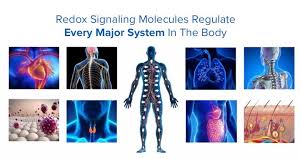Educate on How to Use REDOX for Your Daily HEALTH.
REDOX and Daily Health: What is it?
"REDOX" refers to Reduction-Oxidation reactions, which are fundamental chemical reactions that happen in our body to either gain or lose electrons. These reactions are crucial for energy production, cellular repair, detoxification, and immune function.
When we talk about REDOX in the context of health, we're referring to how these reactions impact our body's ability to maintain balance, or homeostasis, and optimize performance and recovery.
Here's a breakdown of how you can incorporate the principles of REDOX into daily health:
1. Understanding Antioxidants and Free Radicals
- Free Radicals are molecules that can cause damage to your cells. They form as a byproduct of metabolism, environmental exposure (like pollution), or stress.
- Antioxidants are molecules that help neutralize these free radicals by donating electrons, preventing them from causing harm to your cells and tissues.
In a nutshell, REDOX reactions are about balancing the production and neutralization of free radicals in your body.
2. Supporting REDOX Balance for Better Health
There are several ways to support REDOX reactions and maintain that balance:
a) Proper Nutrition:
Eating nutrient-dense foods is key to ensuring your body has the raw materials it needs to maintain healthy REDOX reactions.
- Antioxidant-Rich Foods: Incorporating a variety of fruits and vegetables, especially those rich in vitamins C and E, can support your antioxidant systems. Examples include berries, spinach, kale, and citrus fruits.
- Omega-3 Fatty Acids: These are known to help balance inflammation and support healthy oxidative processes. Good sources include fatty fish (salmon, mackerel), flaxseeds, and walnuts.
- Minerals: Certain minerals, like zinc and selenium, act as cofactors in antioxidant enzymes, helping to neutralize free radicals.
b) Stay Hydrated:
Water is essential for maintaining cellular function and the efficient movement of electrons in REDOX reactions. Dehydration can slow down metabolism and hinder the body's natural detoxification processes.
c) Exercise Regularly:
While exercise increases the production of free radicals (as a byproduct of energy production), it also activates antioxidant defenses in the body. Regular physical activity can help your body become more efficient at managing oxidative stress, improving REDOX balance.
d) Manage Stress:
Chronic stress can lead to an overload of free radicals, contributing to oxidative stress. Implementing daily stress-reduction practices, like:
- Mindfulness Meditation
- Yoga
- Deep Breathing Exercises
can help lower oxidative stress and improve your REDOX balance.
e) Sleep Well:
Adequate sleep allows your body to repair itself and restore REDOX balance. Poor sleep can disrupt the regulation of oxidative stress, leading to increased inflammation and reduced cellular repair.
3. REDOX Supplements
There are supplements that can help optimize REDOX reactions, like:
- NAD+ Precursors: NAD+ is a coenzyme involved in cellular energy production. Supplements like nicotinamide riboside (NR) or nicotinamide mononucleotide (NMN) can support the body's natural ability to balance oxidative stress.
- Glutathione: Known as the body’s "master antioxidant," glutathione plays a key role in neutralizing free radicals. Supplementing with glutathione or its precursors (e.g., N-acetylcysteine (NAC)) can support detoxification.
- CoQ10: Coenzyme Q10 helps in mitochondrial energy production and also acts as an antioxidant. It's especially important for those looking to optimize energy levels.
4. Avoiding Environmental Toxins
Our environment is full of toxins that contribute to oxidative stress. Exposure to things like:
- Pollution
- Cigarette smoke
- Pesticides
- Heavy metals
can overload the body with free radicals. While you can't always avoid these completely, minimizing exposure and supporting detox pathways through nutrition and hydration can help.
5. Daily Habits for REDOX Optimization:
- Eat a Rainbow: Aim to eat a variety of colorful fruits and vegetables every day. The different pigments provide different types of antioxidants that your body needs.
- Avoid Overeating: Excessive food intake, especially processed foods, can increase oxidative stress and inflammation. Eating in moderation is key to supporting REDOX balance.
- Sun Exposure: Getting moderate sun exposure can help your body produce Vitamin D, but overexposure can lead to oxidative damage. 10-20 minutes of daily sun exposure is typically enough for most people.
- Breathing Exercises: Simple, slow breathing exercises can help regulate stress and oxidative stress levels. Oxygen plays a central role in REDOX reactions, so ensuring proper oxygenation is vital.
Thank you for your time.
James Eckburg "MIRACLEMAN"
REDOX HEALTH


